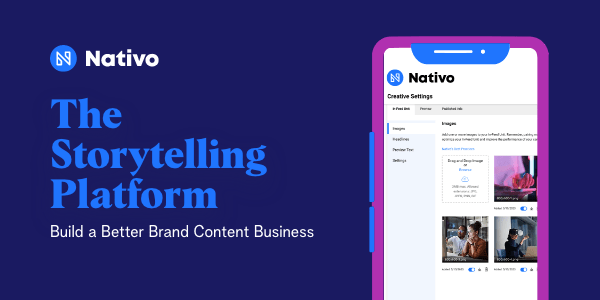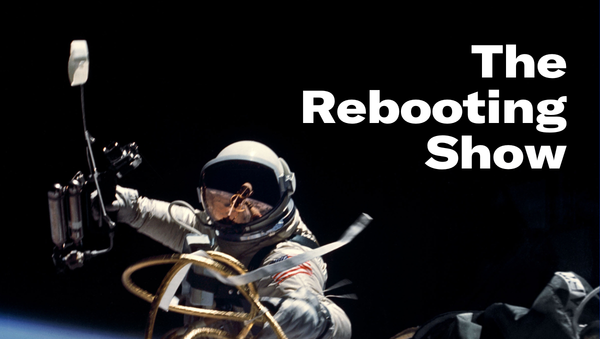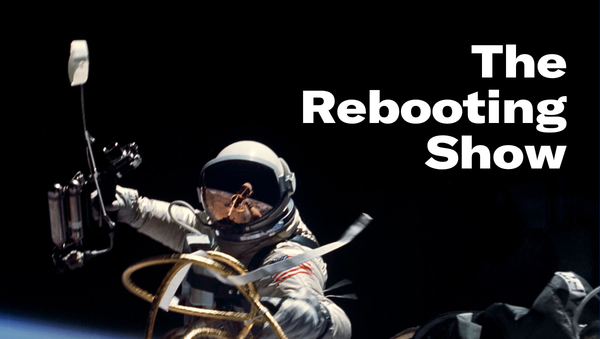The super-empowered individual
AI will force us to confront what it means to be human

Jumpstart Your Direct Sales with Brand Content

Did you know 69% of advertisers plan to increase their content marketing budgets in 2023? Brand content is a big business, so it makes sense that publishers are investing more and more into their direct selling efforts.
At Nativo, we empower publishers to build, execute and deliver sophisticated brand content campaigns with ease and efficiency.
Learn how Nativo’s Storytelling Platform has helped hundreds of publishers build revenue-producing, sustainable brand content businesses through our innovative creative management suite and ad serving technology.
The super-empowered individual
In the late 1990s, globalization and the internet were twin forces that were for the most part wholeheartedly embraced without much thought of the downsides, probably because the people suffering the downsides were not politically powerful.
The “giant sucking sound” Ross Perot warned of during the debates of NAFTA were seen as a last gasp of populism. In 1993, then-vice president Al Gore vanquished Perot during a live CNN debate that drew 16 million viewers – imagine such a thing today – and the political, financial and business power structures moved in lockstep to liberalize markets and embrace tech-driven automation and open markets.
Wiping out factory jobs was just an inevitable advance, hand waved away by both parties with vague talk of retraining programs to ease a factory worker into a service economy job. We didn’t spend much time on the lives upended in unfashionable areas of the country. Trump stepped into this void.
Now, with AI poised to remake large swathes of what tend to call the knowledge economy, the worm has turned. Instead of blue-collar jobs at stake, it is what Marc Andreessen calls the laptop class at risk. You can be sure the debate will be different about the downsides than during the globalization era, when opposition was mostly confined to a few academics and anarchists who smashed up Starbucks at the WTO meeting in 1999. The return of the kabuki theater of debt-ceiling fights seems silly when a bigger discussion should be happening about this next era of change.
During the fervor for globalization, Thomas Friedman emerged as a doe-eyed cheerleader with books like The Lexus and the Olive Tree. 9/11 marked a detour for Friedman to weave his globalization fetish with the Global War on Terror, becoming one of many who gave cover to the march to the Iraq war. (I’m still amazed the New York Times hasn’t been pilloried even more for its role in that debacle, and it’s one reason to remember how often it has carried water for dubious government claims.)
Friedman wrote of the rise of “super-empowered individuals,” who could supercede the power structures of nation states by using networks and tech, sometimes to exert influence malignly through spasms of violence but often positively. Friedman often got caught up in the gee-whiz of technology, marveling that people could send email or take a phone call from a cell phone in Africa.
What he was hinting at was directionally accurate. The shifting of power from institutions to individuals has continued. AI will accelerate that. In God, Human, Animal, Machine, Meghan O’Geiblyn writes of our worship of technology as a new religion, part of our age-old pursuit of making ourselves gods.
“Today artificial intelligence and information technologies have absorbed many of the questions that were once taken up by theologians and philosophers: the mind’s relationship to the body, the question of free will, the possibility of immortality. These are old problems, and although they now appear in different guises and go by different names, they persist in conversations about digital technologies much like those dead metaphors that still lurk in the syntax of contemporary speech. All the eternal questions have become engineering problems.”
AI will force all of us to confront the arbitrary lines we draw around consciousness and intelligence. We use these lines to exert our superiority as humans to all other forms of life even as we engage in the casual dehumanization of those deemed others on account of their gender, race, sexual orientation and gender identity, immigration status, mental health struggles and addictions or any number of other flimsy pretexts. We will have to confront what it truly means to be human, and do so without the metaphors of religion to fall back on as guides. The Golden Rule long ago fell out in favor. Things are gonna get weird.
On a prosaic level, these tools will allow individuals to “scale themselves” in ways that were unimaginable previously. I firmly believe far more people will take an independent path rather than remain within hierarchical, outdated organizations like the corporation, which, dollars to doughnuts, is going to look to AI as leverage against workers or even to replace them altogether. There’s a sadness in an out-of-office auto reply apologizing for being “out of pocket” because they’re sick. No wonder unionization made a comeback.
This new class of super-empowered individuals will gather in new, looser federations that are less hierarchical and more fluid. The all-or-nothing aspect of work is clearly changing. The pandemic showed how many people are unhappy with the status quo. The most hopeful outcome of the AI era will be allowing individuals to realize their potential without sacrificing their autonomy to the alienation of the outdated corporation. I still believe humans will value each other over simulacrums of humans, and real dogs to Aibo the robot dog. Better to be more human than try to fight robots on their terms.
Listen to the latest episode of People vs Algorithms for discussion on how AI will change organizations, whether gaming will ever match its financial might with cultural heft, the perils of linear TV if sports goes DTC, and what Troy found at the Tim Horton’s. It’s my favorite we’ve done so far.
GroupM’s Kirk McDonald on responsible media
We are putting the finishing touches on the program for The New Attention Economy at the Kerv Cafe in Cannes next month. On Monday, I am recording a live episode of The Rebooting Show with GroupM CEO Kirk McDonald, who I’ve known since back when he was an executive at Time Inc and grappling with the changes in a shifting media landscape. Kirk has operated on many sides of the business – prior to GroupM he was the chief business officer at Xandr and president of PubMatic – giving him a unique perspective of how to build a more sustainable and responsible media ecosystem.
Semafor’s new media funding model
Semafor closed a $19 million round of funding, replacing the $10 million from Sam Bankman-Fried and bringing its total funding to $34 million. No word on valuation, but Semafor’s ability to raise that much – and its reported $10 million in revenue so far – is both impressive and worrying at the same time.
Generating that much revenue with a small audience. According to Similarweb, Semafor only has a bit over 1 million visitors a month. Instead, it has relied on what used to be the sidelights of news businesses: newsletters and events. Semafor CEO Justin Smith said events were a far larger part of the business than anticipated.
These are safe havens, if any exist in media. But both newsletters and events do not scale. There are only so many newsletters you can send, and even the most successful newsletter companies have hit a ceiling on growth. Events can be lucrative, and they will likely only grow in importance as people value in-person gatherings in a disconnected world of work, only there is a limit to how many you can do.
The scars of the VC-fueled scale era are still there. Semafor’s backers are not typical venture investors. Media remains an awkward business for venture businesses since its dynamics are antithetical to how the industry’s big-bets-on-big-outcomes model. This alternative path – Semafor’s backers include rich people like Charles Koch, Jerry Yang, Henry Kravis and more – is one also used by The Messenger, which is backed by Josh Harris. Perhaps that will reset expectations for returns, since media will remain a business with a mismatch between influence and financial returns.
Semafor co-founder Ben Smith and Puck COO Liz Gough will join me at The New Attention Economy to discuss building institutional brands that emphasize individuals.
Thanks to Nativo for sponsoring The Rebooting. Check out how they help publishers make interesting and quality content ads but not sacrifice efficiency.
Thanks so much for reading. Please send me feedback at brian@therebooting.com.
Get in touch to discuss sponsorships. An overview of programs is here.




